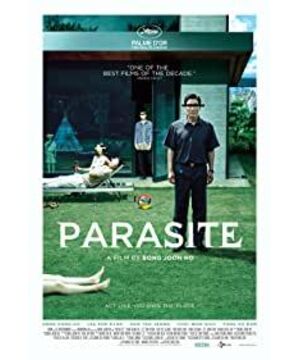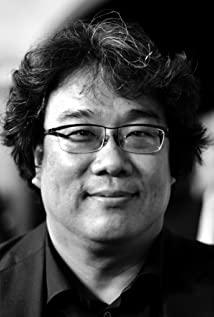This article was originally contained in a soil tea
After "Parasite", which focused on class issues, won the Palme d'Or at Cannes, Feng Junhao returned to the focus of attention.
As a director who graduated from sociology, Feng Junhao has never been stingy in capturing and presenting the current social dilemmas in his films and giving his keen viewpoints. In his twenty-year series of works, we can easily observe his own left-wing political stance that has become more and more obvious in recent years.
However, compared to many other well-known left-leaning directors who also pay attention to social reality issues, such as Ken Roach, Pedro Costa, Mike Lee, Michael Moore, Aki Kourismaki, Dany Brothers, etc., The uniqueness of Feng Junhao lies in his efforts to make his films commercial success by combining genre film narratives and win more ordinary audiences outside the film festival.
This means not only adjusting the narrative and shooting style of the film to suit the public, but also integrating it into the entire commercial film production system controlled by capital. How did Bong Joon-ho do this while gaining recognition from the film festival system known for his high author spirit? All this is not so smooth sailing.
From "Memories of Murder" to "Yuzi"
After his debut film "Kidnapping a Dog at the Door" (2000) hit Waterloo at the box office, Feng Junhao shot "Memories of Murder" (2003), which established his position in Asian film history. This is a social drama with a crime suspense film and a detective film as its shell. It presents the South Korean society in the 1980s to the audience through a serial murder that never caught the murderer. The high-handed control of militarization, the inability of backward power institutions, the film actually conveys the attitude of the 386 generations of South Korea towards the country’s modern history. This generation of elites participated in the student and citizen movement against the dictatorship in their youth, and finally ushered in the democratization of the Korean government. Changes in the entire society made the values of the 386 generation gradually become the mainstream ideology of Korean citizens. This is also an important reason for the huge success of the film in the Korean market.
In the subsequent "Han River Monster" (2006), which uses a monster disaster movie as the shell, Bong Jun-ho takes the South Korean government, which has been indifferent to the victims of his country, as the main target of criticism under the orders of the US military in South Korea. The film also pinned its hopes on an ordinary family composed of three generations of old, middle and youth. Despite their huge sacrifices, they eventually defeated the monsters in the river entirely by their own strength. This deep distrust of the government and the praise of the people's spontaneous power still carry the stigma of the 386 generations of historical memory.
The subsequent "Mother" (2009) was mostly regarded as a variation of "Memories of Murder". Both films have the outer shell of a crime film, and both involve homicide and solving crimes. It's just that in "Mother", the still incompetent police finally misplaced the real murderer and chose to extend the butcher knife to the weaker innocent. However, the focus of "Mother" is actually on the bottom criminals who are confronting public power. They are caught in the dilemma of the moral choice of whether to bear responsibility and pain or to forget the crime and plant others.
This can't help but think of the Korean film "Poetry" (2010) with a similar motif. The director Li Cangdong made the elders in his film also make a noble sacrifice. But in Feng Junhao's case, the mother and son, who are the main body, finally choose to live without compromise. The living conditions at the bottom make it impossible for them to become "good people" if they still want to live. In my opinion, this marks an important turning point in Feng Junhao's work. An important theme discussed in "Mother" is actually, what is it that restricts the spontaneity and enthusiasm of the people as democratic subjects? Or, to put it another way, are the limitations of the democratic constitutional government pursued by the 386 generation highlighted in the helpless choices at the bottom? This kind of democracy is still too expensive for them. Compared with the blind optimism in "Han River Monster", the reflection of "Mother" is profound, and it has the nature of freeing from the limitations of class experience.
So we will find a paradox in Feng Junhao's next creation: his two works that accept international capital and are in line with Hollywood productions are precisely those with the most vivid capitalist critique. "Snow Country Train" (2013) is an apocalyptic class revolution fable that took place at the end of the world, and "Yuzi" (2017) also uses science fiction to describe the evils of capitalist globalization, such as the exploitation of value distribution in the industrial chain. National obliteration and so on. These two works have naturally caused great controversy. One criticism is that the characters in these works are portrayed, the themes come first, and the class narratives appear rigid and mechanical. Another criticism is that the film is the result of already being influenced by Western capital. For example, in "Tamako", South Korea is reduced to a primitive capitalist filter, like a paradise, which actually caters to the Eastern imagination of Westerners. . But in any case, compared with the series of local national fables he created before, Feng Junhao has indeed successfully extended his social criticism to the international scope. If you want to deeply explore the various plights of South Korea's indigenous society, it is impossible to do so without focusing on the entire capitalist global order dominated by the West in which South Korea is already trapped. This is also the logical reason why Feng Junhao's transformation must happen.
The Breakthrough and Limitations of "Parasite"
"Parasite" (2019) is considered to be the director's masterpiece of returning to the local reality of Korea many years later. The film completes a certain tribute to the film history classic "Metropolis" (1927) with an expression method that is not so close to traditional realism. Like this sci-fi giant nearly 100 years ago, the film presents the reality and consequences of serious class division through the space separation between underground and above.
But the social class situation a hundred years later has actually become more complicated. If the class antagonism in "Metropolis" is expressed as the antagonism between the proletariat (mainly the working class) and the capitalists described in classic Marxism, then "Parasite" shows the capitalists, the middle class and the real abject poverty ( The unemployed) conflicts with each other. Butlers and employers "parasitic" in capitalist families enjoy the same living environment and are well paid, which undoubtedly represents a middle-class living standard. Similar "parasites" include capitalist tutors, private drivers and art therapists. They actually rely on participating in the reproduction of the bourgeoisie in exchange for better treatment than ordinary jobs such as pizza deliverers, and they can even enjoy a good personal relationship with the bourgeoisie. This is the class that the Ji Woo family, who lives in the semi-basement at the beginning of the film, tried to squeeze in.
Compared with capitalists and the extremely poor, the social status of the middle class is actually the most unstable and prone to decline. This fate is manifested in the original housekeeper Wenguang in the film. She was easily squeezed out by Ji Woo's family and became a homeless and unemployed. For a young, talented and ambitious person like Jiyu, what is missing seems to be an opportunity to make an appearance. Class mobility is possible, but it usually occurs between the middle class and the extremely poor. This is the cruelty of capitalist society. In order to compete for a little benefit from the capitalists, the proletariat is divided and fought against each other.
In the middle and later part of the film, there is also a theme that was discussed in "Mother": the weak can only protect themselves by swiping a knife at the weaker, and morality is the luxury of the proletariat. In "Parasite", in order to maintain the lie and guarantee the position they have obtained, the Ji-woo family must sacrifice the old housekeeper and his wife, imprison them in a secret basement, and even kill them. The fierce competition reflects how limited the grains given by the capitalists as masters are actually.
But on the other hand, the social order dominated by capitalists has also deeply transformed the spirit and life of the proletariat. For example, the middle class, although they do not have the real means of production, have to become a capitalist in spirit, otherwise they will not be able to serve the bourgeoisie in a qualified manner. This is true for both Ki-woo and Ki-jeong in the film. To improve their lives and their family’s lives, they have to conform to the bourgeois order, standardize production, survive the fittest, and worship the power, and become a lie and unscrupulous in the rules of the game. People.
And on that rainy night, when the Jiyu family was sitting in the lobby of the mansion, they even began to look forward to the scene where they became a bourgeois family. This is a typical middle-class illusion. The outstanding thing about "Parasite" is that it did not hesitate to pierce this illusion. It cast the film's lens into the semi-basement flooded by rain, into the toilet that spouted sewage, into the gymnasium full of poor people, and into The wet, seemingly endless downhill road, casts on merciless murder and filthy blood. This is also a nightmare shared by every middle class, and this heavy rain may be a capitalist economic crisis or just a personal illness.
In fact, the growth of the middle class in developed capitalist countries is an issue that Western intellectuals have repeatedly discussed after World War II. Some views hold that this phenomenon is beyond the prediction of traditional Marxism, making proletarian revolution impossible. Some viewpoints believe that the growth of the middle class itself is the result of the capitalist society learning from socialism to establish a complete and comprehensive social welfare system, which is already a victory for socialism. But the problem ignored by these Western intellectuals is that the global division of labor, trade and financial order dominated by Western countries is actually supporting the welfare systems of these countries. Industrial transfer gradually transferred the industrial working class in the traditional sense to the third world countries. The exploitation of the marginal countries of the capitalist system has gradually surpassed the exploitation of workers by capitalists in Western countries.
But the situation in the West has changed in the past four decades. The implementation of neo-liberalism made Western governments begin to rob the poor and help the rich. Some middle-class people have a strong sense of being deprived, or at least a sense of scarcity, including some working classes who have entered the middle class in the past. But these things are a little different in Korea. As a late-developing capitalist country, the large-scale formation of the middle class in South Korea has only lasted for 40 years, but it is accompanied by strong political participation energy. In addition to the civil movement mentioned above, South Korean industrial workers have also elevated their social status through the vigorous labor movement since the 1970s and 1980s. It's just that the status of these middle classes is very fragile. The government may reduce their living standards at any time for the sake of safeguarding the interests of big chaebols.
During the screening of "Parasite", South Korea's main trade union, the Democratic Labor Union, planned to launch a nationwide general strike to protest the retrogression of labor laws, resulting in its leader being detained. Facing the severe economic situation and the pressure of international competition, South Korea is also carrying out a certain degree of robbing the poor and helping the rich. "Parasite" has once again become the current national fable of Korea, but because it responds to the general anxiety of the middle class in various countries, it has a broader meaning. As a so-called moderately developed country, South Korea is dependent on the core countries headed by the United States. On the other hand, it wants to push more marginal countries to a more marginal position. This horrible substitutability and fluidity gives every parasite a sense of precariousness.
But "Parasite" also has very obvious limitations, manifested in its excessive attention to the middle class. This narrative of shaping the middle class/preparatory middle class as the bottom is objectively related to South Korea’s mid-to-high-end position in the global industrial chain, and to the entry of many metropolises in South Korea into the post-industrial era, but it is indeed neglected. Many exploited. Some of these exploited are local industrial workers in South Korea, and more are third-country workers who provide contract processing and other services to large Korean companies. This kind of treatment also brings about another corresponding problem, which is to weaken and even conceal the identity of capitalists as exploiters in the capitalist system. As a capitalist who owns a technology company, isn't President Park an exploiter? Doesn't he take away the surplus value of hired workers? Let's think about 996 and sick ICU, and then think about workers who assemble Apple phones in Foxconn factories. When catching the bugs, the movie seems to have let go of the biggest bug.
The Tradition and Dilemma of Current Left-wing Films
We will not define left-wing film here for the time being, but will discuss its occurrence first.
In the 1920s and 1930s, in Soviet Russia, Eisenstein and Vertov started the montage movement. To a large extent, the basic film grammar constructed by the two is a technical preparation for the film to participate in the proletarian revolution. Eisenstein emphasized the juxtaposition of different lens fragments to form a certain theme effect, so that the film has an ideological propaganda function. Vertov's "movie eyes" require the search for the autonomy of the camera movement, transcending the limitations of the human eye, incorporating reality fragments into a new structure, and discovering the world that is invisible to the naked eye. Later, the official socialist realist film revised the formal experimental nature of montage, focusing on the popularization of the public. Although there are artistic masterpieces from time to time, they have been criticized because of the direct censorship system.
For Western film festivals, one thing that needs to be corrected is that it was never the film festival that provided support for the creation of European left-wing film authors, but the historical left-wing movement changed the direction of the film festival. The Venice Film Festival originally served the Mussolini regime. The Berlin Film Festival was purely to resist the influence of Soviet ideology and was consciously built as a "free world" film position. After the Cannes Film Festival was influenced by the June 8th Movement in France, it paid more attention to political and practical issues. But it gradually led Western film festivals to a standard left-wing liberalism evaluation system. From a historical point of view, the Italian neo-realist films after World War II and the political films of the 1960s and 1970s, and some of the French New Wave authors since the 1960s (such as the Vertov group including Godard), have more distinctive features. Social critical consciousness, as well as different directions and levels of socialist beliefs. However, some contemporaries with more radical positions are basically difficult to appear in the field of vision of the audience of the film festival, such as the works of third world directors.
In colonial Asia and Latin America, the creation of progressive films was often combined with the demands of opposing imperialist aggression and fascist rule, and striving for national independence, and was therefore often influenced by socialist thoughts. The left-wing film movement in China in the 1930s and the third film movement in Latin America in the 1960s and 70s can be included in this category.
However, the film is still a high-input creative activity in general. With the development of the film industry dominated by Hollywood capital, a large number of consumer films are produced as commodities. These movie products are not only in the United States, but gradually occupy a leading position in the global theaters. Even the festival films that attract the attention of fans every year, from the box office, it is difficult to compete with these films. This has also triggered the European Film Festival itself to gradually form a set of commercialized film production models, which together with Hollywood monopolize the production of films in the world today. The film of the traditional colonial countries has been developed so far, either gradually being incorporated into the European art film festival system, serving as a model of cultural diversity, supporting the ideology of the European middle class, or learning typified routines with Hollywood as a teacher.
In fact, it was with the disintegration of the traditional socialist camp and ideology and the ebb of the global left-wing movement that people began to question whether the concept of left-wing cinema still holds true. To a certain extent, it is indeed necessary to admit that without a broad social movement background, it is difficult to have a sufficiently sustained and in-depth film movement, and left-wing movies have never existed as a result of death but as a living movement. However, on the other hand, it is the fading of the left-wing movement that has made the problems that it focused on in the past become more serious. This also makes left-wing cinema as a continuing movement so necessary and precious.
After all, the plight of left-wing films is also the plight of today's left-wing social movements. They share a series of clusters of questions: who is the proletariat today? Is the working class still the political subject of the revolution? Is there a need to find a new political subject? How to view the middle class? How to view the impact of automation technology on the working class? Is the Leninist party completely bankrupt? How do intellectuals participate in the revolution today? How can a decentralized revolution open up a brand new society? It is often difficult for left-wing films to give direct answers to these questions.
From this perspective, we may be able to understand some criticisms of left-wing film creation. For example, Ken Roche's works are often considered to be selling the suffering of the bottom, just showing a kind of middle-class compassion or moral anxiety. Some people say that his speeches to the judges and guests at the Cannes Awards Ceremony are just "a shout to the dignitaries." Such speeches, like his films, are difficult to reach his target audience and even more difficult to change. In contrast, Mike Lee is thought to like to portray the working class as the backbone of society, with a kind of romanticization of the middle class. The Darnet brothers have gradually shifted from the bottom of the poor to the middle class in the past two decades. In any case, these directors tried to use realism to present hard life and social problems.
For directors along Feng Junhao, the challenge may be that if they want to use market theaters and popular film shells to convey their critical awareness, they must learn to compromise with capital. This strategy also directly limits the theme of the work. For example, it will be difficult for them to present the details of the social crux and texture of directors like Ken Roche, but instead choose to use the form of fables to tell the story of the farmer and the snake. Out of box office considerations, an overly typified style may also damage the connection between the fable itself and reality. But this method has had a certain impact on the mainland. For example, director Xin Yukun's work "Breaking Silent" (2018).
Portuguese director Pedro Costa has been paying attention to immigration issues in his country for many years. His style is considered to be somewhere between record and fiction-this is similar to his colleague Miguel Gomez's recent work "A Thousand and One Nights" (2015), which described the life of the people during the Portuguese financial crisis- -And achieve a unique visual effect through a kind of artificial minimalism. Although to a large extent, his work is more like a "film festival special" than any of the aforementioned directors, the French philosopher Lancière praised his work. In Lancière's art-politics view, art must break the boundaries of existing professions, ethnic groups, classes, circles, etc. through perceptual redistribution. This radical egalitarianism comes from his experience and ideas when he participated in the June 8th Movement in the 1960s. He believes that in the revolution, intellectuals are always on their behalf. Only when intellectuals and the working class "re-educate" each other can it be possible to achieve an equal revolution. In other words, the rebellion must first instigate the revolutionary rebellion, and must first break the stereotype of the revolutionary ideology of the working class. For example, the working class should not be prevented from enjoying life, even if it is the corrupt life of the bourgeoisie that we usually think of.
Lancière may be right. But he still ignored some practical issues. For example, if you want to practice his ideas, how can workers actually pick up cameras and make a movie? Today's popularization of technology helps solve this problem to a certain extent, but capital still effortlessly converts most of the cheap cameras Incorporated into its own system. Without continuous community or community support, it is very difficult to produce a working-class director. If we regard webcasters as directors, they are not countering capitalism. This is more like technology creating a reaction against intellectuals, especially capitalism using technology to create a reaction against intellectuals. The webcaster may claim that he has a better life than before. Do we have a reason to blame him? According to Lancière, it is impossible to blame. In fact, people predict that technology will gradually abolish the superiority of intellectuals, allowing them to converge with a part of the proletariat to form an "intellectual proletariat", and material labor will also be transformed into non-material labor. A more extreme prediction is that a large number of the proletariat will become "abandoned people" and be replaced by automated machines. The theory of surplus value is no longer valid, and there is even no non-material labor.
Should we wait for radical technologism to realize this egalitarianism as radical as Lancière? Or, should the intellectuals do more?
The left-wing movie will be the last movie
"Abandoned people" actually came into being a long time ago.
People in traditional socialist countries that have experienced the pain of transition will have a new understanding of left-wing movies. Zhang Meng's "The Piano of Steel" (2010) and works like Wang Bing's "Tiexi District" (2003) mainly touch on the situation of the old working class thrown into the market economy and reflect on the system. Another type of film, such as the works of many directors from Eastern European countries, directly touched on the ills of the historical national socialist model, such as Andrzej Vaida's "Iron Man" (1981), Kusturica's "Underground" ( 1995) and so on, these movies are often awarded because they are in line with the festival's taste. Of course, it is undeniable that these works are very precious.
In his new work "I'm Sorry, We Missed You" (2019), Ken Roach showed the impact of flexible employment methods adopted by the food delivery platform on a working-class family. In the last movie "I Am Black" (2016), he criticized the welfare system that the British government outsourced to American companies to manage it. We must admire and learn from this social investigative style. Only with investigation can we have the right to speak, and only then can we have the ability to prescribe the right medicine. This kind of report-style film can also go deep into the investigation and analysis of today's left-wing movements such as the workers' strike struggle. An outstanding example is the work "Go to War" (2018) by the French director Stephen Busser. But in the midst of this heavy and even deliberate moral burden, we seem to have sealed the world, and we can't breathe, but forget that some windows are made of glass. It’s too civilized to treat headaches and feet pains. We may need a bit of rogue spirit, or proletarian hooliganism.
In the words of Lancière, how do we redistribute sensibility? If we adopt an attitude of abandoning bourgeois moral evaluation to the Ji Woo family of "Parasite", we have actually performed a redistribution of sensibility. This power is taken from conservative directors. No, there are no parasites here. Some things like head-to-foot upside-down are okay. The rebellion of the Jiyu family was justified. They achieved the occupation of the capitalist space, reversed the unfair distribution, and lived a life without shame and irritation that was supposed to be a capitalist. The basement should have been renovated, and used to regularly host parties in the neighborhood, a public space unknown to its legal owners. Now, the film sounds like a crazy action strategy. At this time, here is a display of alternative possibilities for the present order. Is "Parasite" still too polite? Is it a "Festival Special"? According to the line, "On the edge of transgressing." But it is undeniable that it is still operating within the scope of the proposition. Compared with its forerunners "Burning" (2018) and "The Thief Family" (2018), may it indeed go further?
This may be the current status of left-wing movies, between the stainless steel tweezers of one kind of propositional composition (film festival) and another kind of propositional composition (film capital). Should we say no to this kind of left-wing film? Or, we don't actually have the right to refuse? Perhaps we should see the latest changes, analyze this leftward movement and watch its development? Want to seek a breakthrough, hope The director's personal imagination is of no avail. This is about how to capture the imagination of the people in reality and transmit this imagination. There are some ready-made examples, but they may not be enough, such as "Worker at Home" (2004), "Snail's Strategy" (1993), etc. (It is also worth mentioning Dariofo's drama "Never Pay the Bill") .
The working method of the French Six-Eight Fighting Film Group may still be effective. This is a fluid creation and screening of guerrilla warfare dedicated to breaking class barriers. But when talking about the redistribution of the film system itself, a typical example I have to mention is the Third Film Movement advocated by Latin American directors. It involves the redistribution of the concept of film: a third way is proposed outside the first film (Hollywood) and the second film (Western Film Festival), the real "belongs to us, for us, from us" ('of, for, by us'); redistribution of film production: collective production, rotation of various technical positions, distribution of magazines that popularize film production knowledge, and distribution of tools to the public; redistribution of power between the film and the audience: the post-screening talk as a film One component emphasizes the democratic discussion between the audience and the creator; the redistribution of film screening and distribution: the establishment of the third international cinema line, the establishment of the film liberation cooperative, and so on.
On the other hand, Benjamin should not be forgotten: "In the great historical time and space, along with the collective human collective Dasein, the human collective perceptual perception has also changed. The self-organizing way of human perceptual perception-that is, perception The medium in which it can be achieved-not only has its natural, but also its historical conditions." In fact, it is also a return to the era of the montage movement. Being optimistic about technology means never forgetting the life of a movie. Maybe the movie is dead, but the movie has been dying. Will the future "movie" era be an era when people are in different rooms but share space, face to face, but no one has to be the fixed director and screenwriter? Is this kind of art likely to become a more mobile theater or tent theater for the oppressed? ?
Exhausting the last bit of energy in the film may also prompt people to practice the internationalism of the film. This does not mean to occupy and expand one's own territory. It's going back to the times of Vietnam, the times of Cuba, and the times of Algiers. At the same time, Vietnam came to photograph the United States and France in them. This also means returning to the era of Uris Evans and Chris Mark, an era of creation that shuttles through the scene of various truly political movements. And the current left-wing film may be preparing for the arrival of this kind of world synchronic scene.
The left-wing film will be the last film. Not only is it the first to face the dilemma of film as an art form, but also because the dilemma it faces will ultimately be faced by all films. It is always between the swinging passion and contemplation of revolution or destruction. And this uniqueness is brought about by the tireless pursuit of politics and aesthetics.
View more about Parasite reviews











